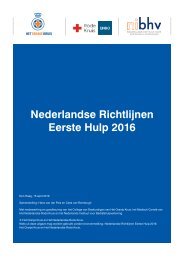Thesis-Anne-Vos-Masters-SBR-and-EU-Law-3
Thesis-Anne-Vos-Masters-SBR-and-EU-Law-3
Thesis-Anne-Vos-Masters-SBR-and-EU-Law-3
You also want an ePaper? Increase the reach of your titles
YUMPU automatically turns print PDFs into web optimized ePapers that Google loves.
a situation must be avoided in which a Commission proposal could be challenged in the Court on the<br />
grounds of alleged lack of consultation of interested parties. Such an over-legalistic approach would<br />
be incompatible with the need for timely delivery of policy, <strong>and</strong> with the expectations of the citizens<br />
that the European Institutions should deliver on substance rather than concentrating on<br />
procedures. 283<br />
It could be questioned how this point of view relates to the now included Article 11 in the Lisbon<br />
Treaty. This Article sets out the following:<br />
1. The institutions shall, by appropriate means, give citizens <strong>and</strong> representative associations the<br />
opportunity to make known <strong>and</strong> publicly exchange their views in all areas of Union action.<br />
2. The institutions shall maintain an open, transparent <strong>and</strong> regular dialogue with representative<br />
associations <strong>and</strong> civil society.<br />
3. The European Commission shall carry out broad consultations with parties concerned in order to<br />
ensure that the Union's actions are coherent <strong>and</strong> transparent.<br />
4. Not less than one million citizens who are nationals of a significant number of Member States may<br />
take the initiative of inviting the European Commission, within the framework of its powers, to submit<br />
any appropriate proposal on matters where citizens consider that a legal act of the Union is required<br />
for the purpose of implementing the Treaties.<br />
The procedures <strong>and</strong> conditions required for such a citizens' initiative shall be determined in<br />
accordance with the first paragraph of Article 24 of the Treaty on the Functioning of the European<br />
Union.<br />
Craig & De Búrca state that this article is 'm<strong>and</strong>atory language'. 284 Also, a Regulation (no.<br />
211/2011) has been adopted with regard to the citizen initiative of Article 11(4). Craig & De Búrca<br />
point out that it is now the question whether this will result in any change in the position of the<br />
Commission <strong>and</strong> the CJ<strong>EU</strong>. They argue:<br />
The ECJ may choose to interpret the Article narrowly, thereby effectively leaving the matter to the<br />
political institutions, but this would be regrettable <strong>and</strong> problematic. It does not sit well with the<br />
wording of Article 11 T<strong>EU</strong> <strong>and</strong> would send a very negative message about the nature of participatory<br />
democracy in the <strong>EU</strong>. It would risk turning a provision that was emant to convey a positive feeling<br />
about the inclusive nature of the <strong>EU</strong> <strong>and</strong> its willingness to engage with its citizenry into one that<br />
carried the opposite connotation. 285<br />
Article 15(1) TF<strong>EU</strong> also states that in order to promote good governance <strong>and</strong> ensure the<br />
participation of civil society, the Union's institutions, bodies, offices <strong>and</strong> agencies shall conduct<br />
their work as openly as possible. Thus, the transparency principle contributes to the achievement<br />
of the participation principle. Moreover, Article 10(3), under Title II on democratic principles,<br />
repeats that every citizen shall have the right to participate in the democratic life of the Union.<br />
In a research for the Council of Europe, Addink has researched the application of the participation<br />
principle from a decentralised level. In the context of public administration, he describes<br />
participation as the participation of citizens to (planned) behaviour of administrations <strong>and</strong> public<br />
bodies. 286 Addink distinguishes, with reference to literature, four motives for participation which can<br />
provide an indication: democratic (influence rule- <strong>and</strong> decision-making), rule of law (individual<br />
protection), corporatist (realisation of responsibilities of CSOs) <strong>and</strong> administrative motives (serving<br />
the administrative body itself). Participation can occur in different grades <strong>and</strong> in different<br />
compositions. The starting point of the research of Addink is formed by three forms of participation:<br />
citizen initiative, citizen panels <strong>and</strong> referenda. But also public consultation (inspraak) is of<br />
importance. Citizen initiatives are a form of minimum-participation, since the normal procedure<br />
283<br />
COM (2002)704, p. 10.<br />
284<br />
Craig & De Búrca (2011), p. 522.<br />
285<br />
Craig & De Búrca (2011), p. 522.<br />
286<br />
Addink (2009), p. 99.<br />
63



